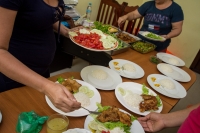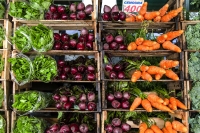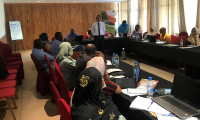News

16/10/2023
Foodborne viruses, microorganisms so small that they cannot be seen by most microscopes, have an enormous impact on peoples’ health, lives and livelihoods around the world. For example, over 20 percent of all foodborne diarrhoea illnesses and nearly 40 percent of all severe or invasive foodborne diseases are caused by viruses.
In September, the Joint FAO/WHO Expert Meeting on Microbiological Risk Assessment (JEMRA) convened one of a meeting on foodborne viruses to provide the most recent science to guide an update to the Guidelines on the Application of General Principles of Food Hygiene to the Control of Viruses...

28/09/2023
Last week FAO concluded an eight-month assessment of Eswatini’s food control system with a final workshop in Manzini where high-level policymakers endorsed the assessment report and committed to implementing its recommendations. The assessment is part of "Strengthening of Capacities and Governance in Food and Phytosanitary Control,” a 5-million-euro project funded by the European Union which began in November 2022 to provide technical support and work with Competent Authorities and other leading institutions in 11 African Union Member Countries. The project is designed to build capacities, strengthen governance and improve strategic planning around two main components: food safety and plant health.
The...

22/09/2023
An event on the margins of the 11th session of the FAO/WHO Coordinating Committee for the Near East on 21 September saw Codex Members discuss the national regulatory situations of cell-based food, a new technique for producing food from cells whose products are not yet on the market in the region. At different stages of readiness to assess and regulate the safety of cell-based food, the countries discussed a range of issues.
“We agree with other countries that this type of food is important,” said the Codex Contact Point for Oman, noting interest in collaboration – in particular, creating specialized bodies...

19/09/2023
Last week FAO concluded a ten-month assessment of the Seychelles’ food control system with a final workshop in Victoria where high-level executives endorsed the recommendations of the final report and committed to implementing its strategic plan. The assessment is part of "Strengthening of Capacities and Governance in Food and Phytosanitary Control,” a 5-million-euro project funded by the European Union which began in November 2022 to provide technical support and work with Competent Authorities and other leading institutions in 11 African Union Member Countries. The project is designed to build up capabilities, strengthen governance and improve strategic planning around two main...

18/09/2023
FAO and WHO are hosting a discussion of human enteric viruses in foods this week. This session of the Joint FAO/WHO Expert Meeting on Microbiological Risk Assessment (JEMRA) will develop scientific advice to guide the elaboration of appropriate Codex Alimentarius food standards on viruses in foods. A group of 23 experts from around the world is now starting to review and discuss information, data and experiences to provide up-to-date scientific recommendations.
Earlier this year a call was issued to obtain globally representative data and information on monitoring programmes for human enteric viruses. The data collected covers sampling plans and testing methods...

06/09/2023
Last week FAO concluded a six-month assessment of Kenya’s food control system with a final workshop in Nairobi where high-level executives endorsed the recommendations of the final report and committed to implementing its strategic plan. The assessment is part of "Strengthening of Capacities and Governance in Food and Phytosanitary Control,” a 5-million-euro project funded by the European Union which began in November 2022 to provide technical support and work with Competent Authorities and other leading institutions in 11 Common Market for Eastern and Southern Africa (COMESA) Member Countries. The project is designed to build up capabilities, strengthen governance and improve...

06/09/2023
On 21 September 2023, a side event on cell-based food will take place in Rome, Italy, during the 11th session of the FAO/WHO Coordinating Committee for the Near East (CCNE11). During the side event each country will have the opportunity to be part of the discussion, share information about national regulatory situations concerning cell-based food and shape the global perspective on this topic.
To participate in the discussion session during the side event, the presenter speaking for his/her delegation is invited to respond to three questions on the online form. Speakers are invited to use the form to structure their...

06/09/2023
Fresh fruits and vegetables contaminated with foodborne pathogens (bacteria, viruses, protozoa, helminths, etc.) have resulted in numerous outbreaks of foodborne illness, made headlines and caused trade disruptions around the world. To better understand these hazards, and how to prevent and mitigate the risks, FAO and WHO convened a meeting of scientific experts to identify and evaluate commodity-specific interventions used to reduce the risk of microbiological hazards in fresh fruit and vegetable production – from primary production to post-harvest activities, transportation, point of sale and preparation for consumption. A new report is now available and provides guidance, taking into consideration the...

23/08/2023
FAO and WHO have noted a record high number of food safety incidents in the newly released International Food Safety Authorities Network (INFOSAN) activity report for the two-year period, 2020-2021. During that time, the INFOSAN Secretariat responded to 375 international food safety events, nearly twice the number, 162, in 2018-2019 and the highest number since the Network was established in 2004. During these events, the INFOSAN Secretariat facilitated communication, connecting Members and ensuring access to essential information, such as distribution details of implicated products to their countries and from their countries. The support provided by the Secretariat also helped authorities...

11/08/2023
Last week FAO concluded a nine-month assessment of Comoros’s food control system with a final workshop in the city of Ngazidja where high level executives endorsed the recommendations of the final report and committed to implementing its strategic plan. The assessment is part of "Strengthening of Capacities and Governance in Food and Phytosanitary Control,” a 5-million-euro project funded by the European Union which began in November 2022 to provide technical support and work with Competent Authorities and other leading institutions in 11 Common Market for Eastern and Southern Africa (COMESA) Member Countries. The project is designed to build up capabilities,...
Stay up to date and connect to our RSS feed!
